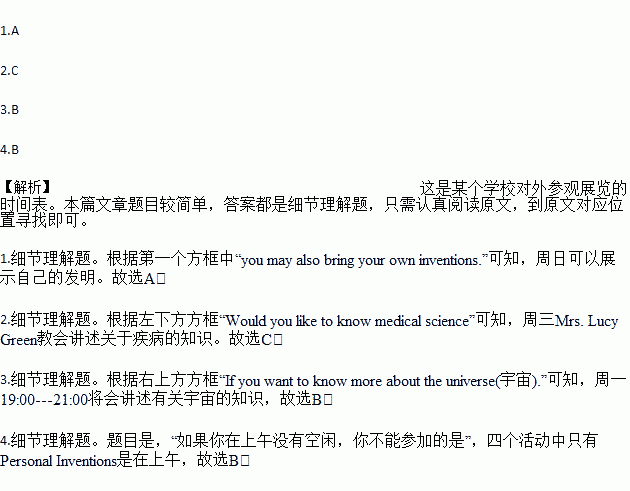题目内容
Welcome to our school. You can do a lot of things here. Come and join us.
Timetable | |
Sunday 8:30---11:30 Personal Inventions You can see many inventions by the students; you may also bring your own inventions. | Monday 19:00---21:00 Space and Man Dr. Thomas West If you want to know more about the universe(宇宙). |
Wednesday 19:30---21:00 Modern Medicine Mrs. Lucy Green Would you like to know medical science? | Friday 18:30---21:00 Computer Science Mr. Harry Morison from Harvard University Learn to use Windows XP. |
1.You may have a chance to introduce your inventions on _________.
A. Sunday B. Monday
C. Wednesday D. Friday
2.You may learn something about a disease called TB from __________.
A. Dr. West B. Mr. Morison
C. Mrs. Green D. Mr. Thomas
3.If you want to learn something about satellites(卫星), you can go to the class from______.
A. 8:30 to 11:30 on Sunday B. 19:00 to 21:00 on Monday
C. 19:30 to 21:00 on Wednesday D. 18:30 to 21:00 on Friday
4.If you are not free in the morning, you can’t join in ________.
A. Space and Man B. Personal Inventions
C. Computer Science D. Modern Medicine
 阅读快车系列答案
阅读快车系列答案

 day years ago when they had first met. “Do you ____ wonder why I was carrying so many things home that day?” asked Bill. “You see, I ____ out my locker because I didn’t want to leave a mess(脏乱) ____ anyone else. I had planned to run away and I was going home to ____ my things. But after we spent some time together ____ and laughing, I realized that ____ I had done that, I would have ____ a new friend and missed all the fun we would have together. So you see, Mark, when you picked up my books that day, you did a lot more. You___ my life.”
day years ago when they had first met. “Do you ____ wonder why I was carrying so many things home that day?” asked Bill. “You see, I ____ out my locker because I didn’t want to leave a mess(脏乱) ____ anyone else. I had planned to run away and I was going home to ____ my things. But after we spent some time together ____ and laughing, I realized that ____ I had done that, I would have ____ a new friend and missed all the fun we would have together. So you see, Mark, when you picked up my books that day, you did a lot more. You___ my life.”